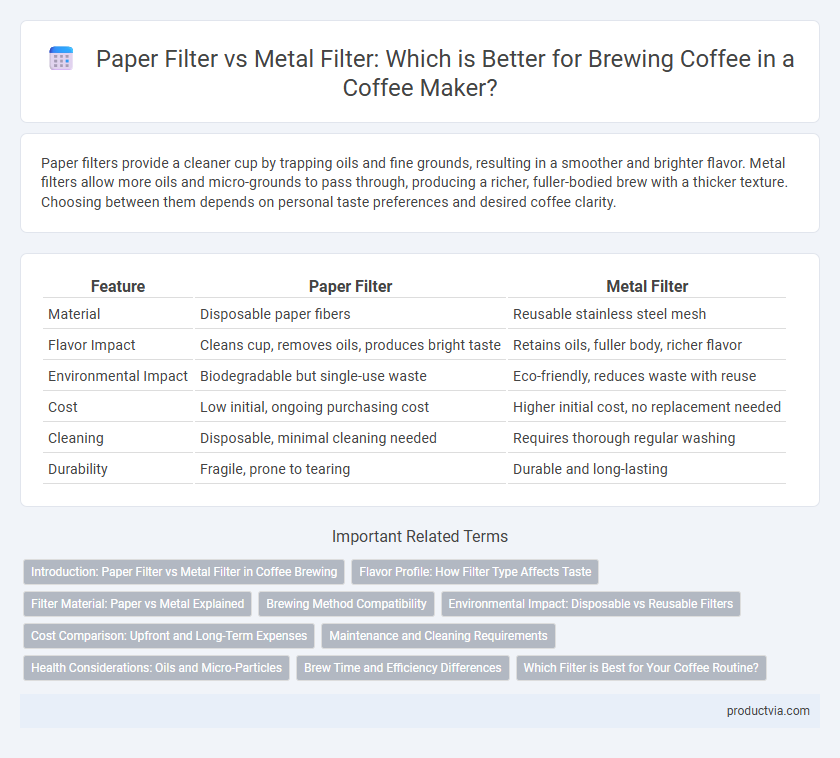Paper filters provide a cleaner cup by trapping oils and fine grounds, resulting in a smoother and brighter flavor. Metal filters allow more oils and micro-grounds to pass through, producing a richer, fuller-bodied brew with a thicker texture. Choosing between them depends on personal taste preferences and desired coffee clarity.
Table of Comparison
| Feature | Paper Filter | Metal Filter |
|---|---|---|
| Material | Disposable paper fibers | Reusable stainless steel mesh |
| Flavor Impact | Cleans cup, removes oils, produces bright taste | Retains oils, fuller body, richer flavor |
| Environmental Impact | Biodegradable but single-use waste | Eco-friendly, reduces waste with reuse |
| Cost | Low initial, ongoing purchasing cost | Higher initial cost, no replacement needed |
| Cleaning | Disposable, minimal cleaning needed | Requires thorough regular washing |
| Durability | Fragile, prone to tearing | Durable and long-lasting |
Introduction: Paper Filter vs Metal Filter in Coffee Brewing
Paper filters effectively trap coffee oils and fine grounds, producing a cleaner and brighter cup with reduced sediment. Metal filters allow more oils and micro-grounds to pass through, resulting in a fuller-bodied brew with enhanced richness and texture. Choosing between paper and metal filters depends on the desired flavor profile and mouthfeel in coffee brewing.
Flavor Profile: How Filter Type Affects Taste
Paper filters trap most coffee oils and fine particles, resulting in a cleaner, brighter cup with pronounced acidity and clarity in the flavor profile. Metal filters allow more oils and micro-grounds to pass through, creating a fuller-bodied brew with richer texture and enhanced bitterness. Choosing between paper and metal filters directly influences the coffee's balance of brightness versus body, shaping the overall sensory experience.
Filter Material: Paper vs Metal Explained
Paper filters, crafted from natural fibers, effectively trap fine coffee grounds and oils, resulting in a cleaner, brighter cup with reduced sediment. Metal filters, typically made from stainless steel or gold mesh, allow more oils and fine particles to pass through, producing a fuller-bodied brew with robust flavor and richer mouthfeel. Choosing between paper and metal filters hinges on the desired taste profile, environmental considerations, and maintenance preferences.
Brewing Method Compatibility
Paper filters deliver a clean, crisp cup of coffee by effectively trapping oils and fine grounds, making them ideal for drip coffee makers and pour-over brewing methods. Metal filters allow more oils and sediment to pass through, producing a richer and fuller-bodied brew, which complements immersion methods like French press and some pour-over devices designed to accommodate reusable filters. Compatibility depends on the coffee maker's design and preferred flavor profile, with paper filters suited for cleaner extractions and metal filters favored for robust, textured coffees.
Environmental Impact: Disposable vs Reusable Filters
Paper filters, often single-use, contribute significantly to landfill waste despite being biodegradable, whereas metal filters offer a reusable, durable alternative that minimizes environmental footprint by reducing solid waste. The production and disposal of paper filters involve continuous resource consumption and carbon emissions, while metal filters require an initial manufacturing impact but promote long-term sustainability through repeated use. Choosing metal filters supports eco-friendly brewing practices by lowering overall resource depletion and waste generation associated with disposable counterparts.
Cost Comparison: Upfront and Long-Term Expenses
Paper filters typically cost between $5 and $10 for a pack of 100, requiring regular replacement that adds to long-term expenses. Metal filters have a higher upfront price, often ranging from $15 to $30, but their reusable nature significantly reduces ongoing costs. Over time, metal filters offer better cost efficiency for frequent coffee drinkers by eliminating continuous paper filter purchases.
Maintenance and Cleaning Requirements
Paper filters require regular disposal after each use, minimizing residue buildup and simplifying maintenance, while metal filters demand thorough cleaning to remove fine coffee oils and grounds that accumulate over time. Metal filters are reusable and eco-friendly but need daily rinsing and occasional deep cleaning with soap or vinegar to prevent clogging and stale flavors. Paper filters offer convenience and less frequent filter care but generate more waste compared to the sustainable and durable metal alternatives.
Health Considerations: Oils and Micro-Particles
Paper filters trap coffee oils and micro-particles, reducing the intake of diterpenes that can raise cholesterol levels and promoting a cleaner cup with fewer impurities. Metal filters allow oils and fine sediments to pass through, preserving the coffee's fuller body and antioxidant compounds but potentially increasing exposure to these substances. Choosing between paper and metal filters impacts both the health profile and flavor complexity of brewed coffee.
Brew Time and Efficiency Differences
Paper filters in coffee makers typically result in longer brew times due to slower water flow but produce a cleaner cup by trapping more oils and fine particles. Metal filters allow faster water flow, reducing brew time and enhancing extraction efficiency while retaining more oils for a fuller-bodied flavor. Choosing between paper and metal filters impacts overall brew speed and extraction, influencing both taste profile and preparation efficiency.
Which Filter is Best for Your Coffee Routine?
Paper filters provide a clean, crisp cup by trapping oils and fine grounds, ideal for those who prefer a lighter, brighter brew free of sediment. Metal filters allow more oils and micro-grounds to pass through, resulting in a fuller-bodied coffee with richer flavor and heavier mouthfeel, suited for robust, textured taste preferences. Choosing between paper and metal filters depends on your desired flavor profile, maintenance preference, and willingness to balance convenience with sustainability.
Paper Filter vs Metal Filter for Brewing Infographic

 productvia.com
productvia.com